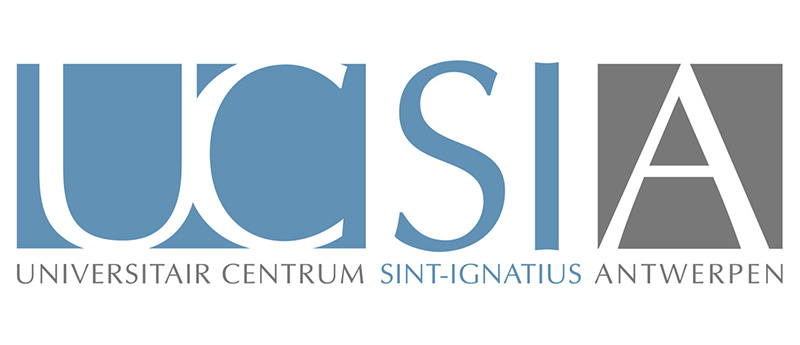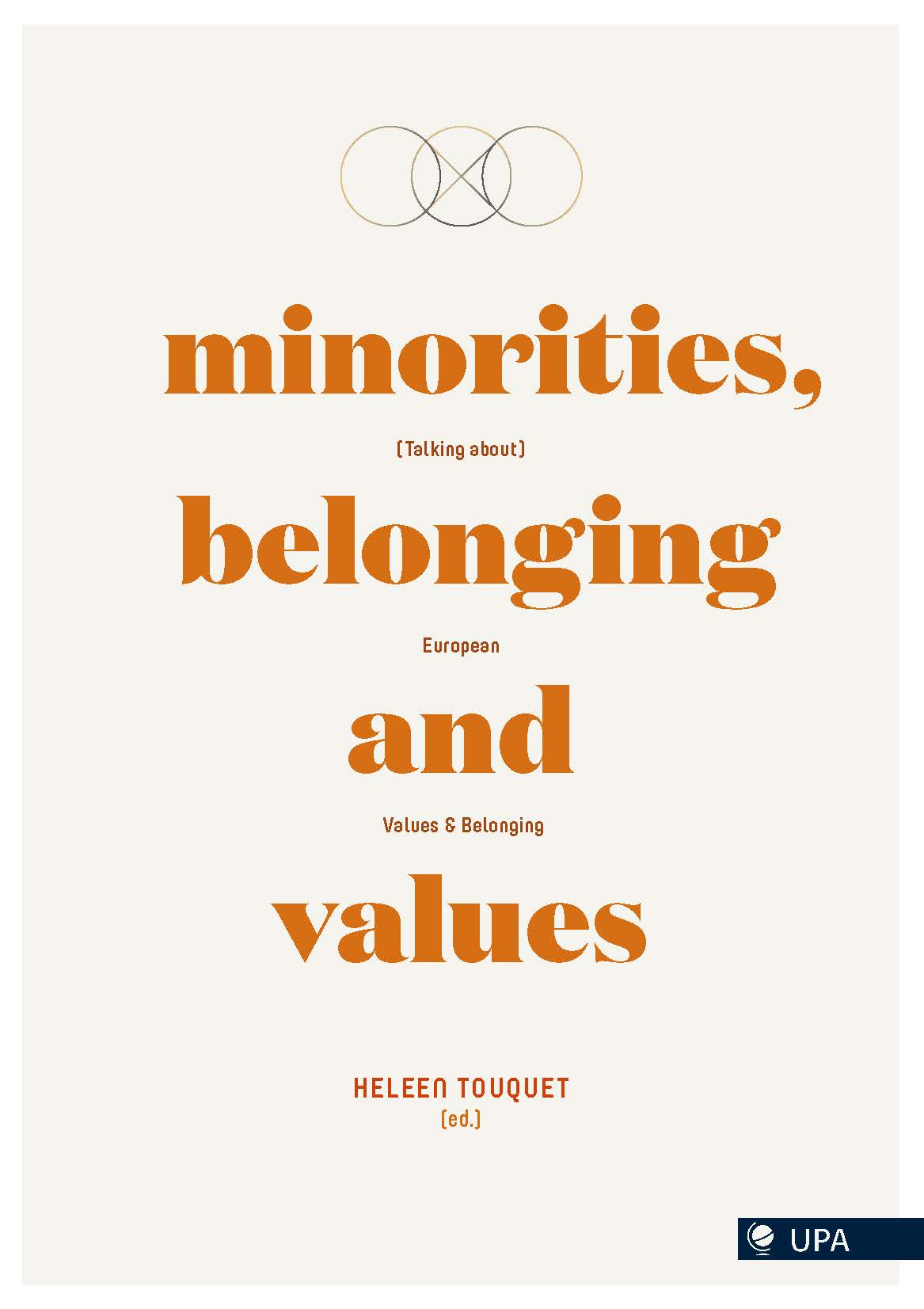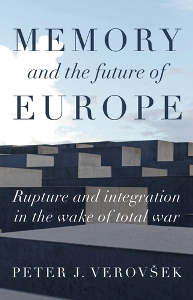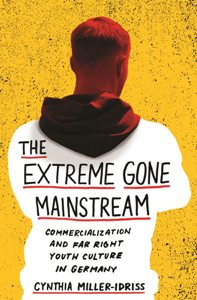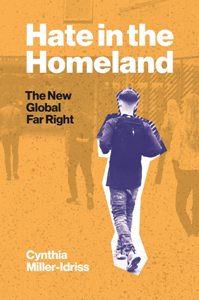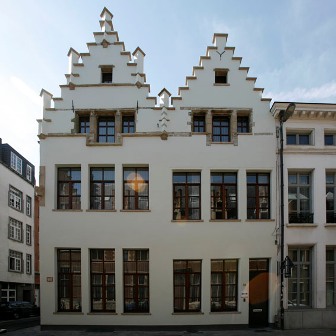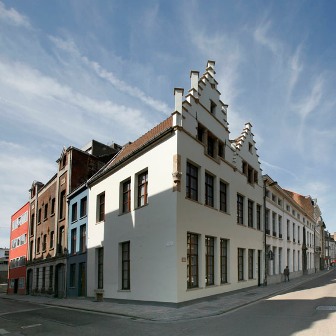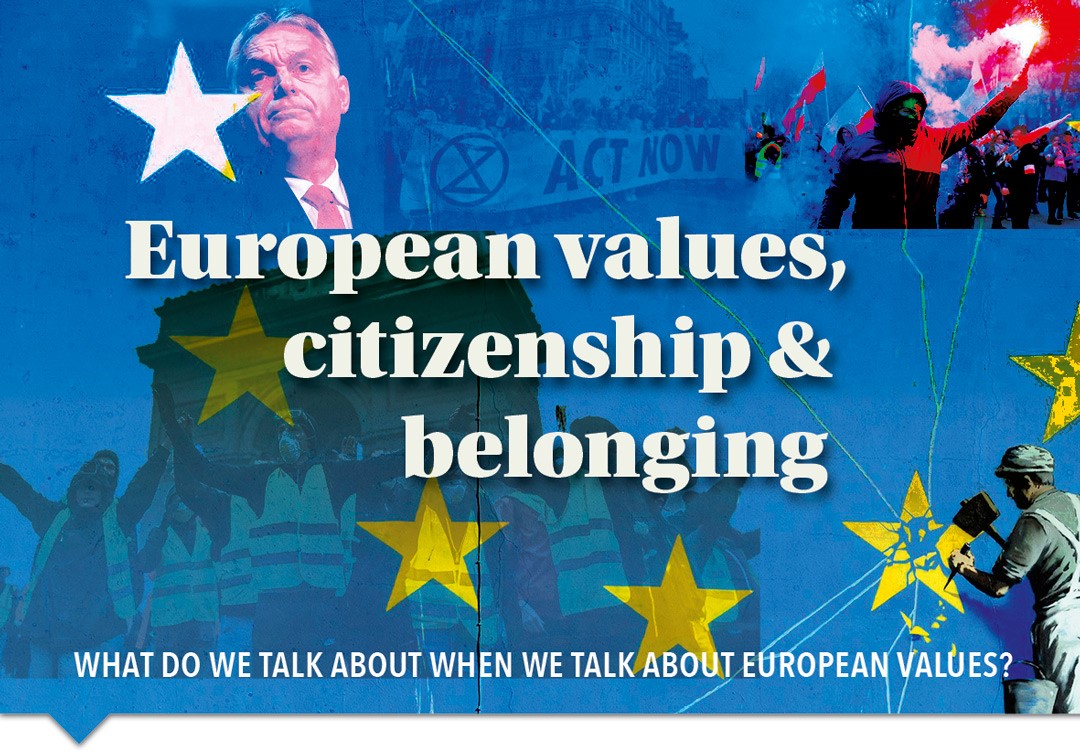
European Values, Citizenship & Belonging
What do we talk about when we talk about European values?
Part 1
The coronavirus pandemic has undoubtedly deepened the crisis of European values. Divisions that became apparent during the financial and refugee crises were laid bare again, in particular with regard to European solidarity and the rule of law. From the beginning of the crisis solidarity between member states has been lacking, as exemplified by Dutch prime minister Rutte who was unwilling to pay for hard-hit countries like Italy and Spain, reigniting North-South divisions about economic solidarity in Europe. Long-standing tensions between the EU and Eastern European states over the rule of law came to a head when the Hungarian parliament voted an emergency law enabling prime minister Viktor Orban to rule by decree.
The European Values lecture series, organized by the Chair in European Values of the University of Antwerp and UCSIA, digs deeper into the crises of European values. François Foret (ULB) discusses the problems inherent to the EU’s own insistence on European values, showing how vulnerable this type of discourse is to backlash. Katlijn Malfliet responds with critical reflections on the impact of EU enlargement towards the East.
Peter Verovšek gives a detailed background of the bifurcation between East and West, explaining how different memory cultures of 1945 and 1989 have contributed to different understandings of democracy.
Later on this year, we will hopefully be able welcome:
- Peter Verovšek and Herman Van Goethem on the role of war recollection in European integration (21 October 2020), and
- Cynthia Miller-Idriss and Noel Clycq on the role of nationalism in European community building (12 November 2020)
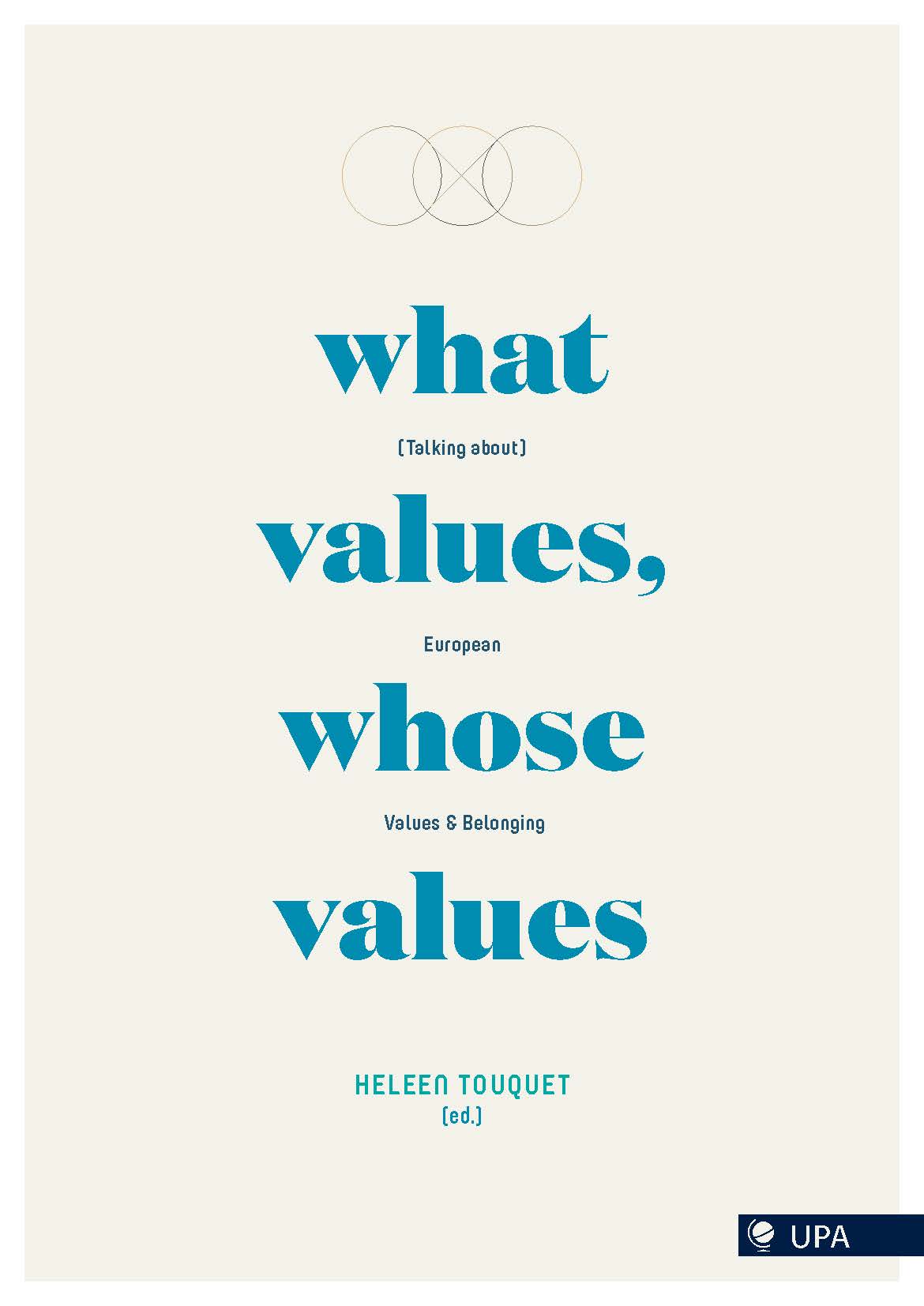
All three speakers contributed an interview to the forthcoming publication What Values, Whose Values based on the series. The book, edited by Heleen Touquet, will be published on 21 October 2020 by University Press Antwerp. Read more…
The role of European values in EU governance
François Foret & Katlijn Malfliet
University of Antwerp – F. de Tassis
4 March 2020, 6 – 8 p.m.
The role of war recollection in European integration
Peter Verovšek & Herman Van Goethem
Online via Blackboard Collaborate
21 October, 6 – 7.30 p.m.
The role of nationalism in European community building
Cynthia Miller-Idriss & Noel Clycq
Online via Zoom
12 November 2020, 6 – 8 p.m.
Part 2
In this second series of reflections on European values, we zoom in on people at the fringes of the European Union and examine what their experiences can tell us about (the crisis of) European values. Lilian Tsourdi looks at the 2015 refugee crisis and examines the gradual erosion of three fundamental European values: solidarity, fundamental rights and the rule of law. Akwugo Emejulu turns our attention to the grassroots and to the exhaustion of women of colour activists who try to build networks of solidarity in a Europe whacked by crisis. In the final lecture of this series, Nuno Ferreira will talk about his work on queer claims for asylum, a case which illustrates the duality of the promotion of LGBT rights as a fundamental European value.
Editor Heleen Touquet interviewed the three keynote speakers of this series for the book ‘Minorities, Belonging and Values’. It was published on 1 December 2021 by University Press Antwerp. Read more…
The Refugee Crisis Solidarity and Values
Lilian Tsourdi & Philippe De Bruycker
14 October 2020
Intersectionality, inequality and the challenge of european values
Akwugo Emejulu & Heleen Debeuckelaere
25 November 2020
Seeking Asylum in Europe: ‘European Values’ and Queer Claims
Nuno Ferreira & Alexander Dhoest
16 December 2020
Session 1:
The role of European values in EU governance
4 March 2020 – University of Antwerp
This was the first of a series of three lectures on the topic of ‘European values, citizenship and belonging’ that UCSIA organizes in collaboration with the Chair of European Values of the University of Antwerp, which is funded by the Baillet Latour Foundation. The session was attended by about fifty people, half of them students at various universities. The guest speakers were François Foret, Professor of Political Science at the Institute for European Studies at the Université Libre de Bruxelles and Director of Cevipol (Centre d’étude de la vie politique) and Katlijn Malfliet, prof.em. of the research institute LINES (Leuven International and European Studies) at KU Leuven and an expert on Russian and Eastern European political institutions and law.
View the lecture
François Forêt’s presentation
The project responds to the mission of UCSIA, as explained by its director, Stijn Latré, in his introduction.
UCSIA continues the Jesuit heritage at the university of Antwerp. One of the ways of doing this was in creating a Jesuit network of universities and social centers, called SCRIBANI. The purpose of this network is to reflect on the social construction of Europe today. That is why UCSIA is still concerned, within its thematic line ‘Europe & Solidarity’, with very concrete social issues, such as food banks.
But theoretical reflection on normative concepts, such as ‘solidarity’ or ‘European values’, is as important. In that respect, UCSIA is happy to work together with professor Heleen Touquet, holder of the Chair of European Values, in the development of a series of lectures on European values.
In philosophical circles, it is often alleged that the specificity of Europe is based on three pillars: Greek philosophy, Christian tradition and Enlightenment values such as freedom, equality and fraternity. From these three traditions stems a common tradition of self-reflection, of self-criticism. The lecture series on European values is a good example of this practice.
UCSIA has another important initiative which combines the key elements of Greek, Christian and Enlightenment tradition: the summer school ‘European humanism in the making’ which it coordinates for the European Federation of Catholic Universities. Students from across Europe can attend a weeklong programme to reflect on Europe and its values in the Italian town of Gubbio.
The three traditions mentioned are often complementary, but can also be at odds with each other, showcasing normative divides within Europe, as in the Lautsi-case. Mrs. Lautsi denounced the Italian state for hanging crucifixes in public schools. In 2006 the European Court of Human Rights first decided in favour of neutrality. But then ten member states of the Council of Europe contested the ruling of the court. In 2011, the Grand Chamber declared that Italy did not violate the Convention, with 15 voices against 2. Political pressure came mainly from orthodox and post-communist countries from Eastern Europe. So here we have conflicting values: autonomy of the individual in conflict with the right of nation-states to manifest their cultural identity publicly. This case is an example of the complexity surrounding European values.
François Foret presented the ValEUR project ‘Governing values, governing through values, governed by values? The European Union as a risk polity’. It investigates the role of values as a political, not an normative, subject.
How are values used in the European political context? There is a shift in discourse from European identity to European values. Why and who defines the agenda? Not one actor and no abstract entity as the state. But first we need to define values. In the research project they are approached as collective mental and cultural representations which are politically enshrined in law, embodied in institutions and instrumentalized in discourses on power relations. Rather than a clash between differing values, there is a competition between political and societal actors and the media, for specific values; human dignity, rule of law and democracy being the most commonly used. These values are very open and vague and if they are not kept under control, this may lead to a backlash, as Orban illustrates when he appropriates these values, claiming that his country embodies the real Christian European spirit against western European corruption of the said values. The value game is unpredictable and is used as gate keeper between self and other, unity and deviance, market and law, public and private spheres.
Why should we bother about European values? They are being used in name of something else, to legitimize the EU. Since the seventies two competing narratives have been predominant: the narrative of nation building (emphasizing a common past and destiny) and the narrative of legitimation through output (in terms of peace, prosperity and the common good). Since 2000 the narrative of European values, combining elements of both preceding values, has come to the fore. It is based on a common culture (rooted in normative foundations) and market oriented (promoting economic cooperation and materialistic consumption). Foret focuses on this development in his forthcoming book. He is also involved in a comparative research project with Airo Hino of the Waseda University in Tokyo. It revisits the value discourse in a different context. If Europe promotes its Christian democracy, can we find a similar discours in the Asian context? Such a comparison might help us to understand the singularity of the European project.
Katlijn Malfliet took on the challenge of a comparative approach, from her field of expertise, Russian, Central- and Eastern European politics. She is worried about the European project which takes the shape of a Greek drama. We were building Europe and then the fall of the wall introduced a turn in the plot, followed by the enlargement to Central- and Eastern Europe. Did we talk about common values before this? No, we professed the religion of ‘the rule of law’. It was the tool by excellence for integration, based on the belief that economic cooperation would suffice to guarantee sustainable peace. We exported our legal rules and institutional model to transform other countries coming from a completely different context. We reintroduced the Washington consensus, which once worked for us to build peace after World War II, after the fall of Russia. The Kremlin has been very effective over the past two decades in undermining the positive achievements of the European construction, as in the case of the rights of minorities and the support it lends to Assad, pushing Syrian refugees towards Europe. Russia will become normative for Europe as the core country in Asia. Military clashes are not realistic, but the antagonism takes the form of disinformation and cyberwar.
Central and Eastern European countries felt threatened in their hard gained newly established sovereignty. For them it was as if they moved from governance by Moscow to governance by Brussels. Russia still had offered social protection which Europe did not with its neoliberal directives. They were forced to subscribe to the ‘acquis communautaire’ without negotiation. This induced a feeling of humiliation, acerbated by the absence of a social and cultural European dimension. They reacted by strengthening their national cohesion. Ivan Krastev calls it a ‘Frankenstein story’ with Orban and his Polish, Czech and Slovakian counterparts selectively picking and choosing elements from the European acquis as a basis for building systems of illiberal democracy. They develop their own idea of European values. We are caught between a democratic deficit and a deficit of values. This is due to the fact that Western Europe lost the balance between political and civil rights, on the one hand, and economic and social rights, on the other. We have to revisit the values that lay the basis for European cooperation. This lecture series should contribute to that urgent and fundamental reflection.
Online class Peter Verovšek:
Memory Politics in Western and Eastern Europe
4 May 2020 – University of Antwerp
Peter Verovšek, Lecturer in Politics and International Relations at the University of Sheffield, gave an online class on 5 May for students of the courses European Values and Politics of Memory of the Faculty of History at the University of Antwerp. Due to the coronavirus pandemic, the planned public lecture in the series European Values, Citizenship and Belonging had to be postponed until 21 October.
He presented his thesis about the difference between memory politics in Western and Eastern Europe as an explanation for diverging views on democracy and reactions to crises, as witnessed with the 2015 refugee crisis. Collective memory is crucial for societal integration and ruptures offer opportunities for new (shared or oppositional) narratives to emerge. The key rupture for Western Europe was provoked by fascism in 1945 and led to the view that nationalism forms a danger for peace. For Central and Eastern Europe 1989 formed a breakpoint that incited the repudiation of external influence in domestic affairs.
In the West, in and after Nazi times, scepticism about the nation state’s sovereignty in protecting citizen’s rights, formed the impetus to look for supranational human rights protection. By contrast, the loss of sovereignty in Eastern Europe to the Soviet Union during 40 years of communism gave predominance to a primordial concern about self-governance over human rights. The ideals of liberalism, multiculturalism and globalization promoted by the West conflict with the preoccupations of the East. For the East, imposing liberal democracy is conceived as the will of Brussels and brings back painful memories of the times of subjection to the will of Moscow. In the East people are critical of global approaches given the communist international order they were subjected to. Central and Eastern-European countries tend to reinvigorate their own national pre-Cold War (Christian) culture, which they feel is being threatened by multiculturalism. This explains the reluctance to accept refugees, while the West recognizes their right to asylum, at least in theory.
Western Europe shows little consideration for the collective memory of Central and Eastern Europe, anchored in the rupture following the fall of communism in 1989, and instead imposes the memory of 1945 for the whole of the European Union. There is a need to also recognize the Eastern experience of totalitarianism as part of the collective memory of the European Union.
Paying attention to the effect that these narratives of the past have on politics of today should be part and parcel of the academic research agenda, so that the historical lens may complement the more fact-based political and economic analyses.
Session 2:
The role of war recollection in European integration
webinar on 21 October 2020
In this session of the series European Values, Citizenship and Belonging, Peter Verovšek (University of Sheffield) talked about rupture and integration in the wake of total war. Historian Herman Van Goethem, rector of the University of Antwerp, responded to his talk.
The development of the European Union as a community-based project of integration outside the constitutional architecture of the nation-state is the most significant innovation in twentieth century political organisation. Despite its many achievements, events at the start of the twenty-first century – including the political, economic, and financial crisis of the Eurozone, as well as the Brexit and the rise of populism – pose an existential threat to the EU. VerovŠek’s book, Memory and the Future of Europe, addresses the crisis of the EU by treating integration as a response to the rupture created by the continent’s experience of total war. It traces Europe’s existing pathologies to the project’s loss of its moral foundations in the collective remembrance of total war. As the generations with personal memories of the two world wars pass away, economic gain has become the EU’s sole raison d’être. If it is to survive its future challenges, the EU will have to create a new historical imaginary that relies not only on the lessons of the past, but also builds on Europe’s ability to protect its citizens by serving as a counterweight against the forces of globalisation.
Peter J. Verovšek is Lecturer (tenured Assistant Professor) in Politics and International Relations at the University of Sheffield. He studied Government and German as an undergraduate at Dartmouth College. He then conducted research on the continuing effects of the memories of World War II in the politics of the former Yugoslavia as a U.S. Fulbright Scholar (2006-07), before receiving his MA (2008), MPhil (2010) and PhD (2013) in Political Science from Yale University. He is a critical social and political theorist interested in the interconnection between democracy, capitalism and the nation-state. His work to date has focused on how socially mediated collective memories serve as resources for political innovation in the aftermath of broad historical ruptures. His forthcoming book, ‘Memory and the Future of Europe: Rupture and Integration in the Wake of Total War’ (Manchester University Press 2020), examines the role that the collective memories of the two World Wars have played in the development of the European Union.
Peter Verovsek’s presentation
Read more…
Session 3:
The Role of Nationalism in European Community Building
webinar on 12 November 2020
In this session of the series European Values, Citizenship and Belonging, Cynthia Miller-Idriss is Professor of Education and Sociology at the American University in Washington, DC, talked about belonging, exclusion and national space. Noel Clycq, Research professor in the domain of Governance of learning in an era of globalization, department of Training and Education Sciences at the University of Antwerp responded to her talk.
During a recent city-wide debate on a new ethics and diversity curriculum for Berlin schools, a local politician criticized the prevailing approach to inclusive curricula, which is typically presented in instrumental terms, as something that will either help ethnic-majority children better navigate diverse future career environments or will help immigrant children better integrate into European society. What if instead, he suggested, we simply approached diversity education with one question in mind: What would it take to ensure that everyone feels at home in the country where they live?
This lecture uses this question as a starting point, arguing that attempts to achieve that goal require looking deeply at a number of assumptions in any given society. Who gets to claim membership in, or ownership of, imagined and real territories? Why do national spaces and places engender such defensive and racialized protectionism from so many people? Can homelands—or the spaces and places that foster them—help us better understand the rise of the far right and its move from the fringes to the mainstream? Addressing these questions forces us to look more carefully at the importance of territory and geography and its intersections with identity, a sense of belonging, and the appeal of calls to defend, guard, or fight back against incursions and invasions. It requires analyzing the deeply emotional roots of ideas and ideals related to national homelands, regional heartlands, and a range of racialized geographies that rely on metaphors like motherland and fatherland or roots and soil to evoke natural ties and organic connections to specific local and national places. In closing, the lecture turns to possible ways forward and whether it is possible to shift national narratives in ways that are not only more inclusive, but are also oriented in key ways toward the question of what it would take, in the end, for everyone to feel at home in the country in which they live.
Session 4:
The Refugee Crisis, Solidarity and Values
webinar on 14 October 2020
In this session of the series European Values, Citizenship and Belonging, Evangelia (Lilian) Tsourdi (Maastricht University) talked about EU’s ‘Refugee Crisis’ as a Crisis of EU Values and Governance. Philippe De Bruycker, a lawyer specialised in European Immigration and Asylum Law, Free movement of European citizens and comparative aliens law, responded to her talk.
Crisis vocabulary has consistently dominated public discourse on asylum in both the EU and its Member States since 2015. The spike in arrivals of individuals seeking asylum in the EU highlighted the limitations inherent in the legal design and implementation of the EU asylum policy, most notably a structural solidarity deficit. It also brought into sharp relief deeper rifts of a legal, political, and moral dimension with Member States refusing to welcome refugees in the name of their national cultural and religious identity.
Drawing from the research underpinning my forthcoming monograph ‘EU Asylum Law & Policy: Constitutional Foundations and Administrative Governance’ (OUP, 2021), I deconstruct the EU’s ‘refugee crisis’ narrative, revealing it to be a crisis of EU values and governance. First, I retrace the gradual erosion of three foundational concepts: fundamental rights, the rule of law, and solidarity. Next, I engage in a comprehensive analysis of underexplored elements of asylum administrative governance, assessing limitations in the EU’s asylum system implementation design and evolving shifts in its administrative architecture. I conclude with critical remarks on the symptoms of a crisis of EU values and governance in asylum: recourse to unilateralism, and deflection of protection obligations- both internally and externally- while offering some perspectives on how they may be addressed.
Session 5:
Intersectionality, Inequality and the Challenge of European Values
webinar 25 November 2020
In this session of the series European Values, Citizenship and Belonging, Akwugo Emejulu (University of Warwick) talked about intersectionality, inequality and the challenge of European values. Heleen Debeuckelaere, historian, writer and organizer responded to her talk.
Drawing on my six nation comparative research project, Women of Colour Resist, my talk will propose a tentative politics of exhaustion as a way to understand the promise and perils of women of colour activists’ solidarity work in Europe. Through an examination of how women of colour activists strategise, organise and mobilise, I will discuss the political and psychological impact of exhaustion on the lives of activists. To declare exhaustion, I argue, is to hail the equally exhausted to build solidarity, mutuality and a collective identity. Understanding the politics of exhaustion can help shed light on the creative practices of women of colour activists in a Europe wracked by crisis, as well as highlight the structural processes that demand activists’ exhaustion.
Akwugo Emejulu is Professor of Sociology at the University of Warwick. Her research interests include the political sociology of race, class and gender and women of colour’s grassroots activism in Europe and the United States. Her work has appeared in the Journal of Ethnic and Racial Studies, Politics & Gender, Race & Class, Soundings and the European Journal of Women’s Studies. Her co-authored book, Minority Women and Austerity: Survival and Resistance in France and Britain, was published in July 2017 by Policy Press. Her co-edited book, To Exist is to Resist: Black Feminism in Europe, was published in 2019 with Pluto Press. Her new book, Fugitive Feminism, is forthcoming with Silver Press.
Heleen Debeuckelaere is historian, writer and organizer based in Brussels. She regularly contributes to Belgian and international media and was involved in the birth of the non-profit organization “Metissen van België” and the video channel Black speak Back.
Session 6:
Seeking Asylum in Europe: ‘European Values’ and Queer Claims
webinar on 16 December 2020
Nuno Ferreira (University of Sussex) and Alexander Dhoest (University of Antwerp) conclude the series on European values, citizenship and belonging with a webinar on gender identity and human rights.
The European asylum policy has been a battleground on many accounts for many years. Neither the EU’s Common European Asylum System, nor the role of the Council of Europe (and especially the European Court of Human Rights) in asylum matters, have been immune from criticism. This is also the case in relation to those asylum claims lodged based on one’s sexual orientation or gender identity (SOGI). This is a significant issue: every year, thousands of individuals claim asylum in Europe based on their SOGI, and more often than not their claims are treated unfairly. SOGI asylum claimants face particular difficulties in establishing their claims and obtaining a positive assessment of their credibility. Furthermore, there are strong signs in several European jurisdictions that the SOGI dimensions of asylum claims are treated in a particularly insensitive way, based on inappropriate legal, cultural and social notions.
This talk explores the key findings and recommendations produced by the project SOGICA, which studied the legal and social experiences of SOGI asylum claimants in Europe. The findings unearthed strong tensions between Europe’s image of itself as a progressive, liberating and freedom space, and its oppressive, unfair and prejudiced treatment of SOGI claimants, both in legal and social contexts. The project’s recommendations highlight how the European asylum systems can treat SOGI asylum claims more fairly, by focusing on the scope for improvement of law and policy. The talk explores policy recommendations that address adequately the socio-cultural, gender identity and sexual diversity of asylum claimants from human rights, feminist, intersectional and queer perspectives.
Nuno Ferreira’s presentation
